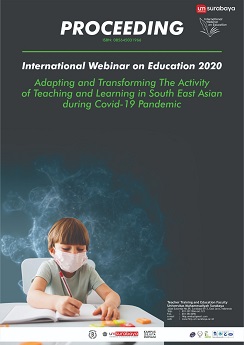Learning reflections in the covid-19 pandemic period (study at the Muhammadiyah educational institutions in Surabaya)
Abstrak
Abstract.
Coronavirus outbreak (Covid-19) has attacked the entire world, transmission is so
rapidly to death. Futher, the impact of covid-19 pandemic is not only attack immune system, but also social life. Such as economy, culture, politic and education.. This study aims to analyze and reflect online learning activities during the Covid-19 pandemic, addressing obstacles and assessment carried out to ensure the quality of learning. The method used is a qualitative method with a descriptive analytic approach. The study in Muhammadiyah Educational Institutions is the Muhammadiyah University of Surabaya and Schools at the senior secondary level namely Muhammadiyah High Schools in the city of Surabaya amount of 8 schools.The sample respondents were lecturers, vice-principals and teachers, with 32 respondents lecturers, and 24 respondents consists of 8 vice-principals and 16 teachers. The results and discussion showed the effectiveness of the implementation of online learning with significant achievements. A reflection for educators to is to enhance their competencies in mastering digital technology, designing modern online learning with various innovations and interesting learning methods to develop students' cognitive, affective and psychomotor domains in this pandemic period. For students they have to enhance the ability of using technology so that they become better prepared to face the challenges of learning in the industrial era 4.0. For Educational Institutions it is necessary to design a curriculum to be more adaptive to extraordinary situation.The conclusion is that the implementation of online learning during the Covid-19 pandemic at Muhammadiyah University of Surabaya and High Schools in the city of Surabaya run smoothly and effectively using Moodle owned by each educationalinstitutions which was combined with several applications and platforms.
Referensi
Perhimpunan Dokter Paru Indonesia (PDPI), PanduanPraktekKlinis: Pneumonia 2019-nCoV. Jakarta: PDPI, 2020.
S. Boopathi, A.B. Poma, and P. Kolandaivel, ―Novel 2019 Corona virus structure, mechanism of action, antiviral drug promises and rule out againt its treatment‖. Journal of Biomolecular structure and Dynamics. ISSN: 0739-1102 (Print) 1538-0254, 2020. (Online) https://www.tandfonline.com/loi/tbsd20.
VD. Hoek, K. Pyrc, MF. Jebbink, OW. Vermeulen-, RJ.Berkhout, KC. Wolthers. ―Identification of a new Human Coronavirus‖.Nat Med. 2004; 10: 368-373.
K.Mc. Imtosh, and JA Englund, ―Coronoviruses and toronirises including sever acute respiratory syndrome feing, cherry, Dommler, Harisson, Feigim-cherry textbook of pediatric infectious disease‖. 7th edPhiladelphia : Saunders/Elsevier
F. Firdaus, Update Corona Indonesia 23 Mei 2020 & Data COVID-19 DuniaTerbaru (online): https://tirto.id/fCeP
W. Darmalaksana, R. Yuli Ahmad Hambali, A. Masrur, and Muhlas. Analisis Pembelajaran Online Masa WFH Pandemic Covid-19 sebagai Tantangan Pemimpin Digital Abad 21. Bandung: UIN Sunan Gunung Djati, Karya Tulis Ilmiah, 2020
N. Emmanuel Mahaye, The Impact of COVID-19 Pandemic on Education: Navigating Forward the Pedagogy of Blended Learning, April 23, 2020. Retrived https://scholar.google.com/scholar?hl=en&as_sdt=0%2C5&q=The+Impact+of+COVID-
+Pandemic+on+Education%3A+Navigating+Forward+the+Pedagogy+of+Blended+Learnin
g++Ngogi+Emmanuel+Mahaye+%2C+23+April+2020&btnG=
D.R. Ayu Uswatun Khasanah, H. Pramudibyanto, and B. Widuroyekti, Pendidikan Dalam Masa Pandemi Covid-19, Jurnal Sinestesia, Vol. 10, No. 1, April 2020
https://sinestesia.pustaka.my.id/journal/article/view/44
Gunawan, N. Made Yeni Suranti, and Fathoroni, Variations of Models and Learning Platforms for Prospective Teachers During the COVID-19 Pandemic Period, Indonesian Journal of Teacher Education, Vol. 1 No. 2, 2020: 61-70
Surat Edaran Mendikbud Nomor 4 tahun 2020 tentang Pelaksanaan Kebijakan Pendidikan dalam Masa Darurat Penyebaran Covid-19.
Surat Edaran LLDIKTI Wilayah VII Nomor 578 tahun 2020 tentang Pencegahan Coronavirus pada Perguruan Tinggi di Lingkungan LLDIKTI Wilayah VII.
Surat Edaran Rektor UMSurabaya Nomor 0290/MLM/II.3.AU/A/2020 tentang Peningkatan Kewaspadaan dan pencegahan Penyebaran Covid-19 di lingkungan UMSurabaya.
U.A. Chaeruman, ―PEDATI Model DesainSistemPembelajaran Blended‖. Direktorat Pembelajaran, Direktorat Jenderal Pembelajaran dan Kemahasiswaan. Kemenristekdikti, 2017.
M. I. Onwusuru, and B. A. Ogwo, ―Cloud-based portal for professional development of technology educators in Nigeria and the emerging virtual workplace‖. International Journal of Arts and Technology Education, 11(01): 1 – 17, 2019.
B. Allagui, ―Writing through WhatsApp: an evaluation of students writing performance‖. International Journal of Mobile Learning and Organisation, 2015.
S.Grover, B. Garg, and N. Sood, ―Introduction of case-based learning aided by WhatsAppmessenger in pathology teaching for medical students‖.Journal of Postgraduate Medicine, 2020.
N. A. Zulkanain, S. Miskon, and N. S Abdullah, ―An adapted pedagogical framework in utilizing WhatsApp for learning purpose‖. Education and Information Technologies, 2020.
A. Andujar. Analysing WhatsApp and Instagram as Blended Learning Tools.Recent Tools for
Computer- and Mobile-Assisted Foreign Language Learning, 2020.
U. Rahaded, E. Puspitasari, and D. Hidayati, ―The Impact of WhatsappToward UAD Undergraduate Students‘ Behavior In Learning Process‖. International Journal of Educational Management and Innovation, 2020.
S. Mällinen, ―Teacher effectiveness and online learning‖. In Teaching & Learning Online (pp. 139-149).Routledge, 2018.
R. Panigrahi, P. R. Srivastava, and D. Sharma, ―Online learning: Adoption, continuance, and learning outcomeA review of literature‖. International Journal of Information Management, 43, 1-14. Pemerintah, 2018.
Surat Edaran Rektor UMSurabaya Nomor 0380/MLM/II.3.AU/A/2020 tentang Aktivitas Pembelajaran dan Sistem Kerja di Lingkungan UMSurabaya Pasca Tiga Bulan Penyebaran Covid-19.
Permenristekdikti Nomor 44 tahun 2015 tentang Standar Nasional Pendidikan Tinggi.
B. S. Bloom, ―Taxonomy of educational objectives. Handbook 1: Cognitive domainâ€. New
York: David McKay, 1956.






